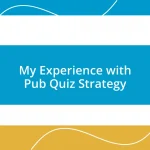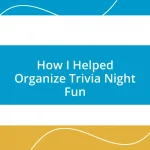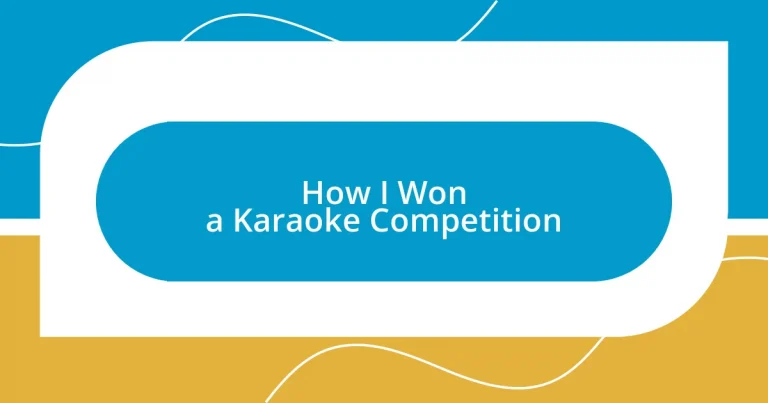Key takeaways:
- Preparation and song selection are crucial for a genuine and impactful karaoke performance, focusing on personal connection and audience engagement.
- Mastering performance skills through practice, vocal warm-ups, and studying successful artists enhances stage presence and emotional delivery.
- Handling competition nerves involves mindset shifts, breathing techniques, and focusing on sharing the music rather than the audience’s judgment.
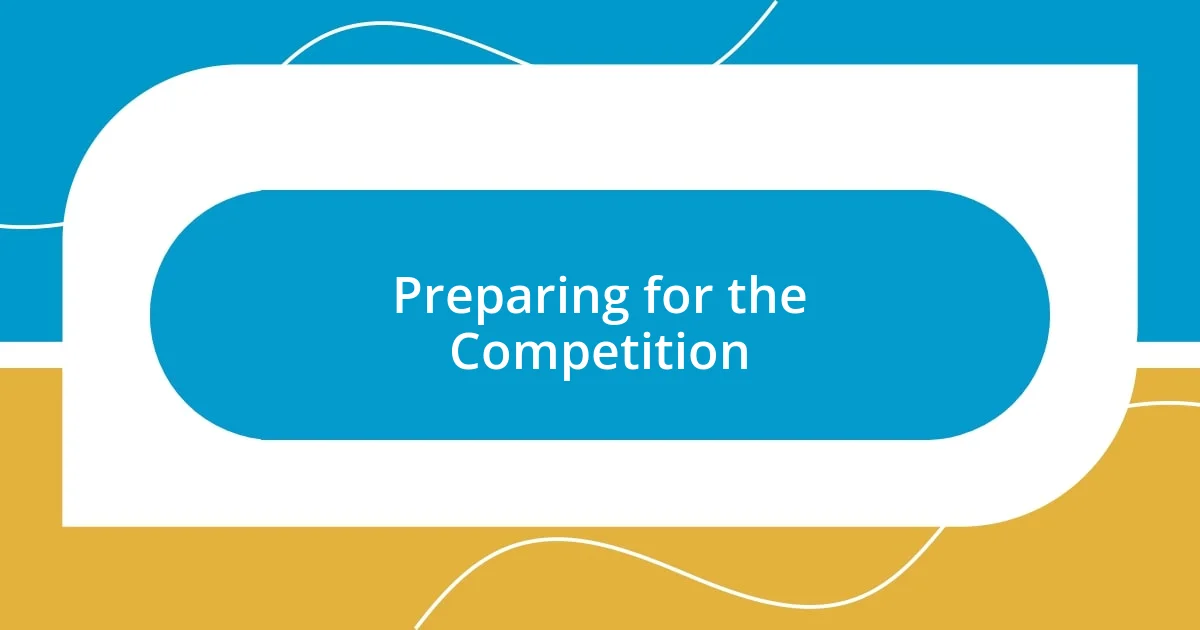
Preparing for the Competition
Preparing for the competition was more than just selecting a song; it was about connecting with the music. I remember pacing around my living room, belting out my chosen track, feeling every high and low. Did I really nail that chorus? There’s a special thrill in finding the perfect song that speaks to you—it sets the stage for a performance that’s genuine.
As the days ticked down, I focused on building confidence. I practiced in front of friends, gauging their reactions while also calming my nerves. Their encouragement felt like a warm blanket, reassuring me that I wasn’t just another performer—this was my moment to shine. Have you ever felt that kind of support? It’s invaluable, and I leaned on it.
I also considered my stage presence, thinking about how to engage the audience. Connecting with them is what transforms a song from mere notes into an experience. I recalled a time when I watched a performer command the stage with just a smile and a movement. That lingering memory pushed me to plan my own choreography, however minimal, to ensure I captivated everyone there. The right preparation doesn’t just polish your singing—it adds an unforgettable spark to your performance.
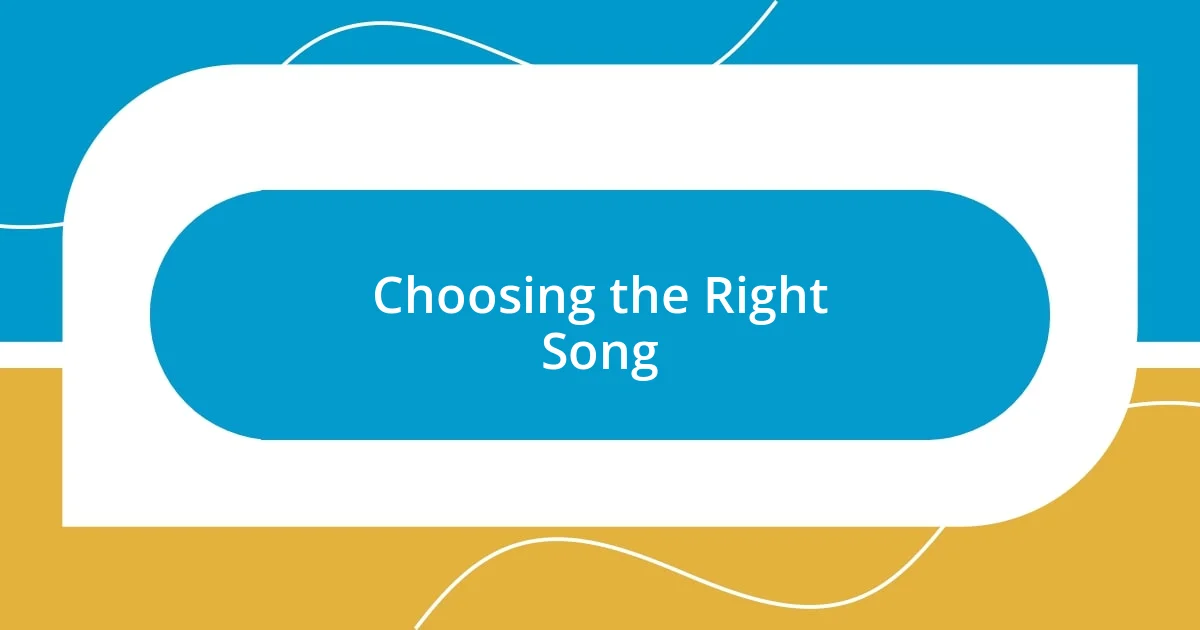
Choosing the Right Song
Selecting the right song can feel like a daunting task, but it’s also where the excitement begins. I remember standing in front of my playlist, almost frozen by the possibilities. The song I chose was more than just a popular hit; it was an anthem that resonated deeply with me. When the lyrics hit home, I could feel the energy surging through me, ready to transform nerves into pure passion. It’s essential to pick a song that reflects your personality and vibe—people can sense that authenticity.
Here are some factors to consider when choosing your karaoke song:
- Familiarity: Pick a song you’ve sung many times before; it builds confidence.
- Range: Ensure the song fits your vocal range to avoid straining your voice.
- Connection: Choose something that evokes personal feelings; it enhances your performance.
- Audience Appeal: Consider what will excite and engage your audience.
- Mood: Match the song’s energy to the atmosphere of the event—uplifting tunes often work best!
These elements helped me narrow down my choices, creating a more impactful experience on stage. Each detail added to my comfort level and made the performance something truly special.
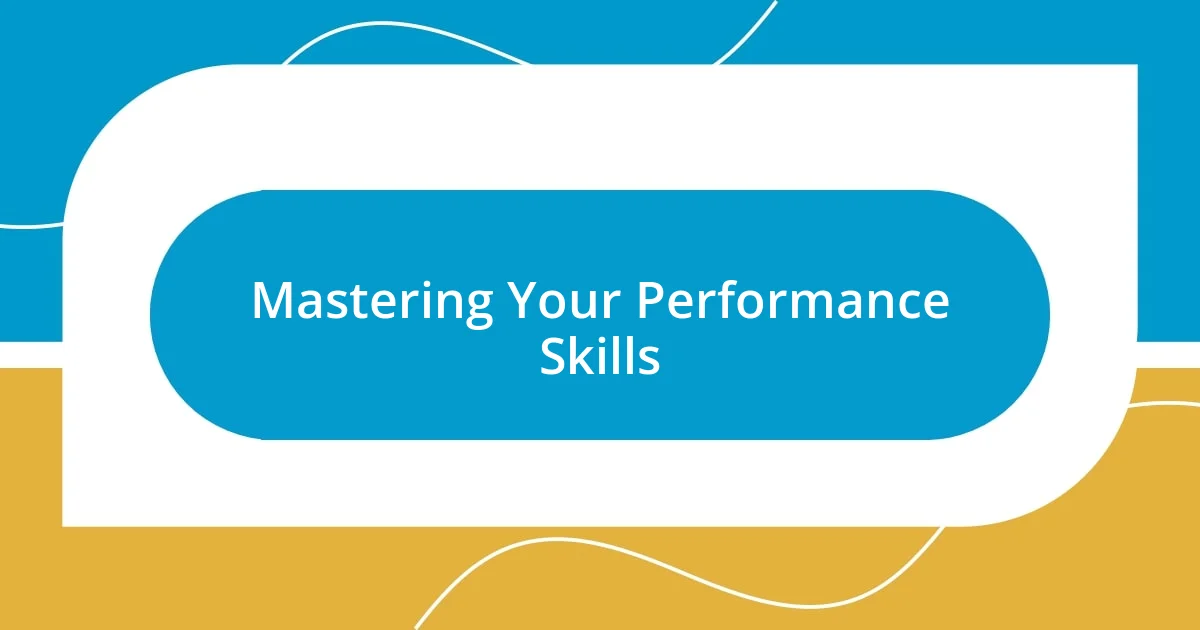
Mastering Your Performance Skills
Mastering performance skills is an art that requires both practice and a personal touch. I recall one rehearsal where I decided to put my usual preparations aside and simply let loose. That night, I danced around my living room, channeling the energy of my favorite artists. I felt silly at first, but as the song progressed, I realized I was not just singing—I was embodying the music. That transformation inspired me to embrace my own rhythm, which made a world of difference when performing live.
To elevate my stage presence, I studied the greats. Watching seasoned performers taught me the importance of storytelling through body language. I noticed how they used gestures to convey emotions, pulling the audience into their narrative. This learning made me consider how minor adjustments, like moving toward the crowd or maintaining eye contact, could amplify my connection with the audience. Have you ever seen someone on stage captivate a room just by their presence? I aimed for that energy, knowing it would brighten my own performance.
Lastly, vocal warm-ups were a game changer for me. Before each performance, I’d spend time honing my voice to ensure it was in peak condition. The difference was palpable; a few simple exercises not only cleared my throat but also boosted my confidence. I still remember the day I hit high notes effortlessly, something I hadn’t done in previous competitions. It was like magic! Practicing different vocal techniques helped me discover my true voice, and I couldn’t recommend it enough. It’s all part of that intricate dance between skill and artistry.
| Factor | Impact on Performance |
|---|---|
| Vocal Warm-ups | Enhance vocal quality and build confidence |
| Body Language | Engages audience through storytelling |
| Practice | Transforms nerves into excitement and fluidity |
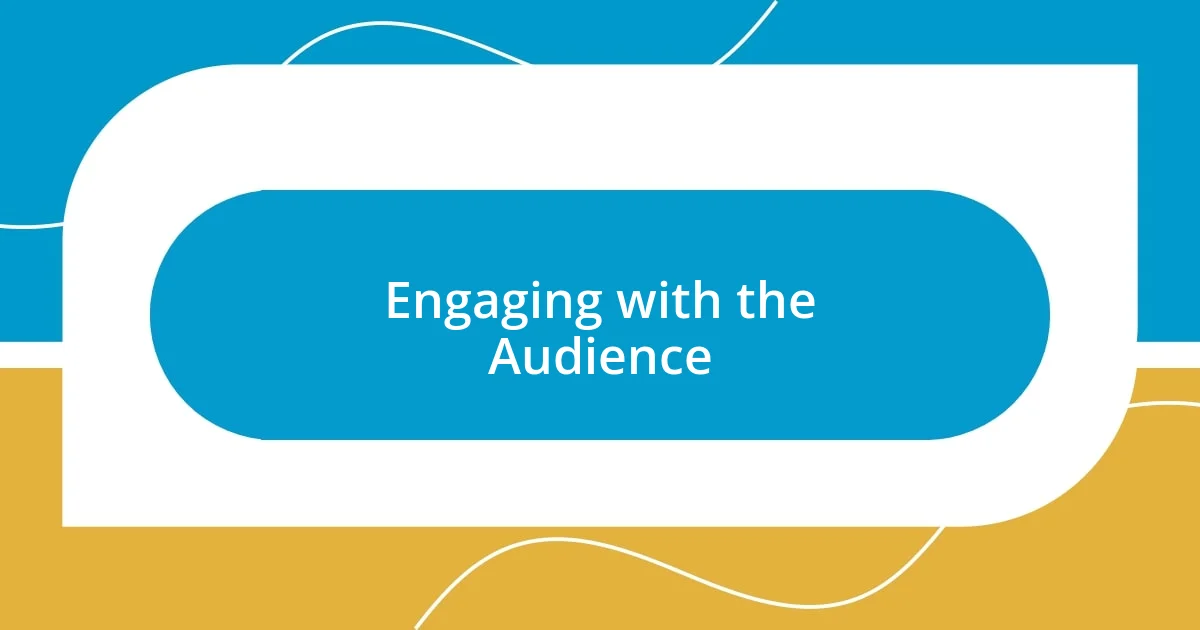
Engaging with the Audience
Engaging with the audience is where the magic truly happens. I once participated in an event where I felt the room’s energy shift the moment I made eye contact with someone in the front row. It’s astonishing how a simple glance can create a moment of connection, affirming that I wasn’t just performing for myself, but for everyone in the room. Do you remember a time when an artist pulled you into their world with just a look? That’s the power of engagement.
I also learned to invite my audience to sing along, breaking down that invisible barrier between us. During one performance, I strategically paused for the crowd to fill in the lyrics, and their voices pushed my confidence to new heights. It felt like we were creating something together in those moments. I believe that encouraging participation fosters a shared experience, and that’s memorable for everyone—myself included.
Final touches like changing the tempo or adding little ad-libs in response to audience reactions made a huge difference too. One night, I noticed a group swaying to the beat, so I adjusted my energy to match theirs, turning the performance into a lively conversation rather than a one-sided show. This adaptability made me realize how dynamic live performances are, and I relished transforming my routine into an unexpected journey for all of us. Isn’t that what karaoke is all about?
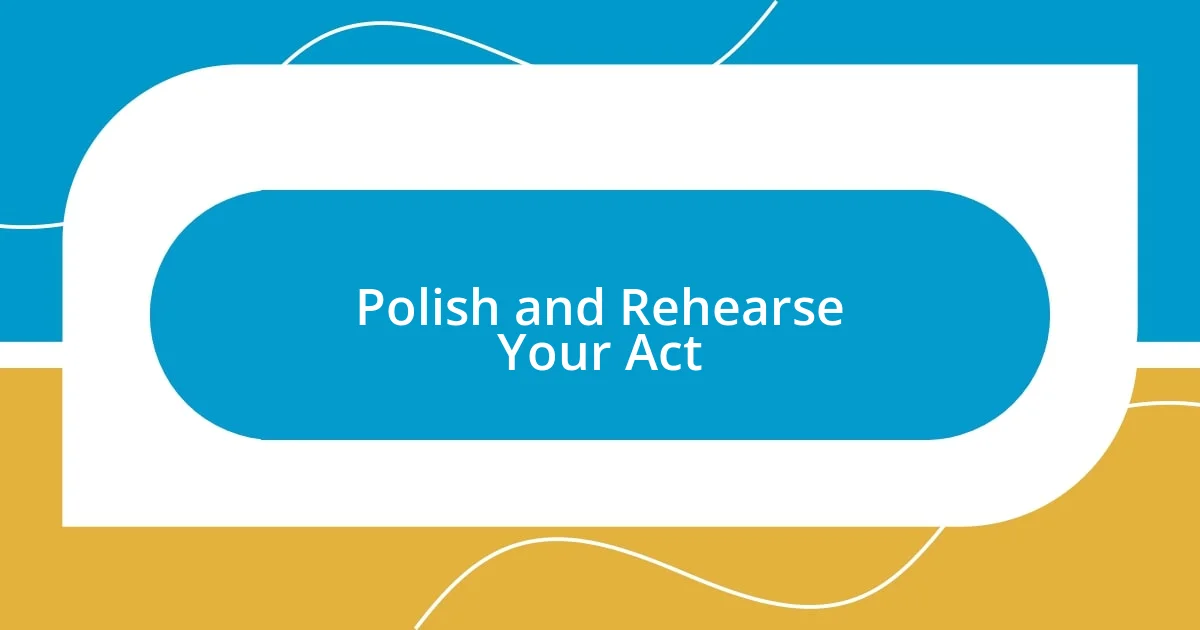
Polish and Rehearse Your Act
Polishing your act isn’t just about vocal practice; it’s also about crafting a performance that feels genuine and engaging. I remember one particular week where I decided to focus on the emotional delivery of my chosen song. Instead of mechanically going through the lyrics, I let myself reflect on the story behind them. It was profound! I felt tears prick my eyes as I connected with those lyrics on a deeper level, which transformed how I delivered the song on stage. Have you ever had a moment where the lyrics just resonated so deeply that you felt compelled to share that emotion with others?
Rehearsing wasn’t just about hitting the right notes; it was my time to experiment. During one practice session, I tried out different vocal inflections and even played with dramatic pauses. I distinctly remember a night I was rehearsing, and I stumbled upon a vibrato that added so much texture to my voice. It was almost like discovering a hidden talent! I couldn’t wait to perform it live. Practicing in front of a mirror, I noticed how my confidence grew as I found the perfect balance of vulnerability and strength. The mirror became my best friend; it taught me how to see myself as the artist I aspired to be, turning insecurities into unique expressions.
One of the most valuable lessons I learned was the power of repetition in rehearsal. I often sang the same song multiple times, but each time, I focused on different elements. One day, it was all about vocal projection; the next, I embraced my dancing. By the end of that week, I could hardly recognize the nervous performer I once was. Instead, I stood before you as someone who owned every note and move. Isn’t it fascinating how dedication and practice shape us, allowing us to blossom into confident performers ready to own the stage?
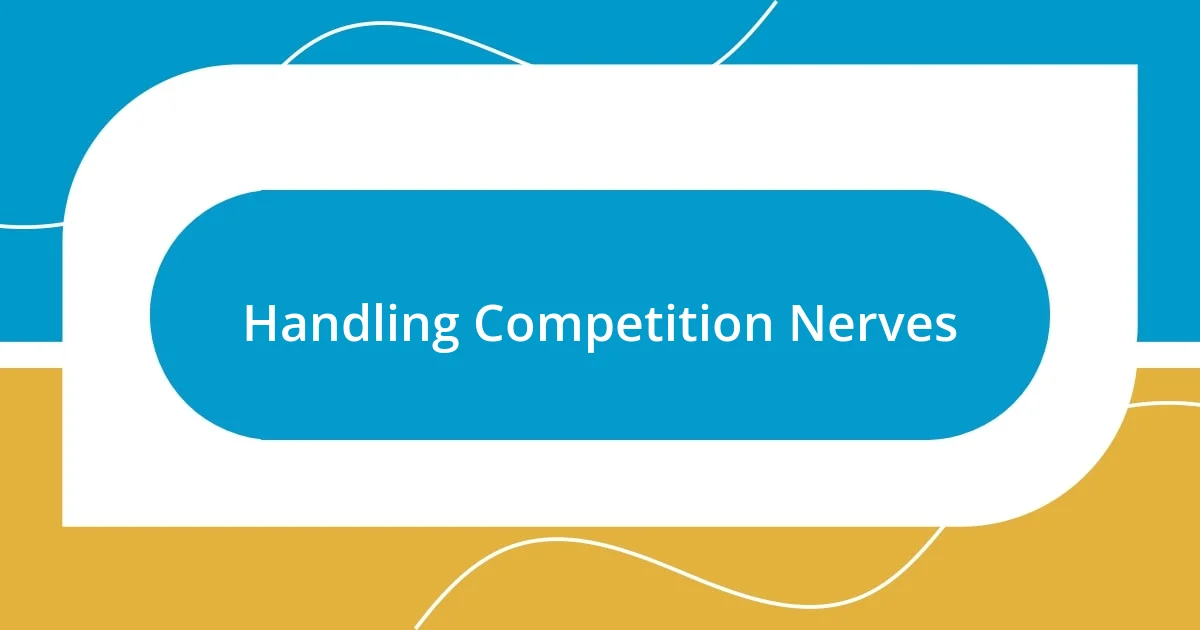
Handling Competition Nerves
When I first stepped onto the stage, my heart raced like it was training for a marathon. It’s natural to feel jittery before a performance, and I found that embracing my nerves was a game changer. Instead of trying to suppress that anxious energy, I imagined it as excitement—like I was about to embark on an exhilarating adventure. Have you ever noticed how the anticipation of a special moment can feel both thrilling and daunting? That realization shifted my mindset completely.
Breathing techniques became my secret weapon. Before I sang, I cultivated a ritual of deep, calming breaths. Picture this: I would visualize each inhale as gathering confidence while exhaling all those pesky doubts. On one occasion, as I took a deep breath, I felt the tension release from my shoulders, and suddenly the stage felt like my home. This little practice helped clear my mind and allowed me to focus on the performance instead of the audience’s expectations. It’s interesting how something as simple as breathing can transform the way we approach our fears, isn’t it?
I also learned the value of perspective. Rather than thinking about the competition, I shifted my focus to sharing a piece of myself through music. There was one performance where I made a heartfelt decision to connect with my song’s story rather than the judging eyes I felt on me. I found that when I genuinely immersed myself in the moment, the competition nerves faded into the background. What’s your go-to strategy for reeling in those pre-performance jitters? Finding that anchor can truly make all the difference, turning those nerves into a powerful source of energy.
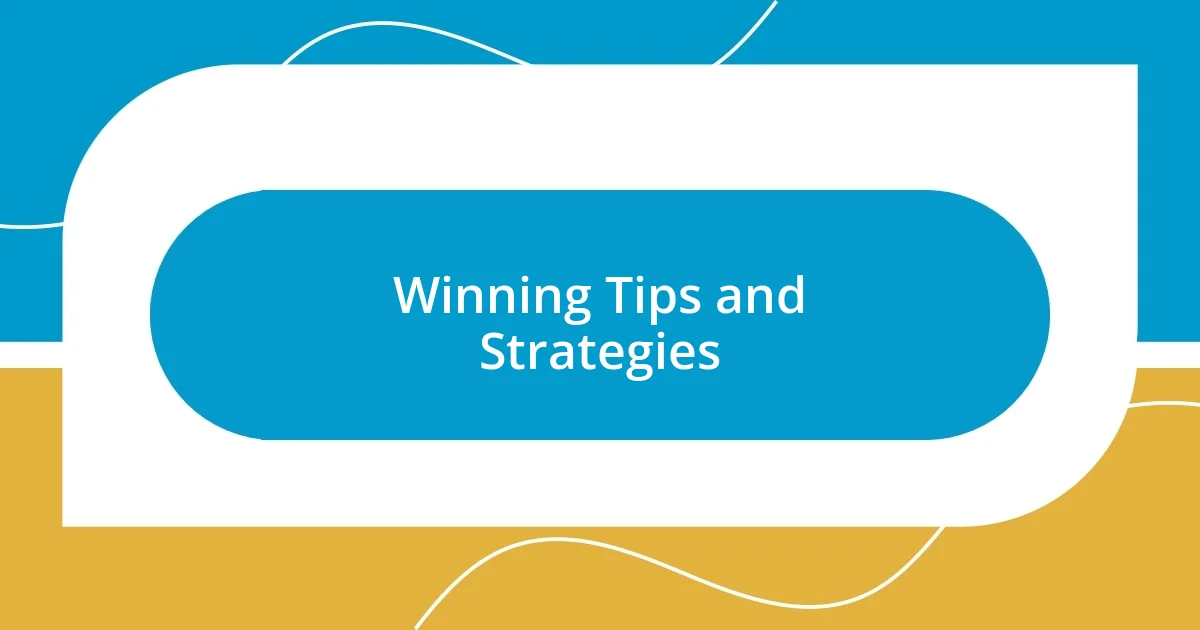
Winning Tips and Strategies
One effective strategy I found essential for winning was connecting with the audience. During one performance, I gauged their reactions, and it truly impacted how I conveyed my emotions. I remember making eye contact with a couple in the front row; their joyful smiles made me feel like I was sharing an intimate moment with friends rather than performing for a crowd. Have you noticed how a simple interaction can elevate the entire experience? It’s almost like sparking a two-way conversation through music.
Choosing the right song was another pivotal piece of my success. I learned that the best song for my voice isn’t always the latest hit but one that tells a story I resonate with. There was a time I decided to sing an old classic that held a special memory for me—suddenly, every note felt like a bridge to my past. Reflecting on moments that the song encapsulated allowed me to dive into the true essence of the performance. Have you ever considered how deeply a personal connection to your song can enhance your performance?
Lastly, I discovered that presenting a persona can be incredibly beneficial. In one competition, I decided to embody a character that aligned with the song’s mood. Transforming into that persona gave me an exhilarating sense of freedom and creativity. I felt more than just a singer; I became an entertainer. This change not only boosted my confidence but also captivated the audience’s attention. What if stepping into alter egos could help us express our authentic selves even better on stage? Embracing this technique might be just what you need to create an unforgettable performance.



